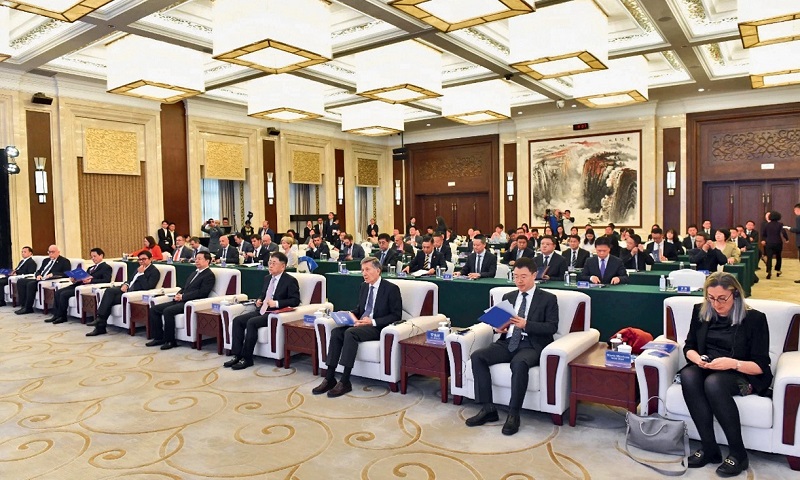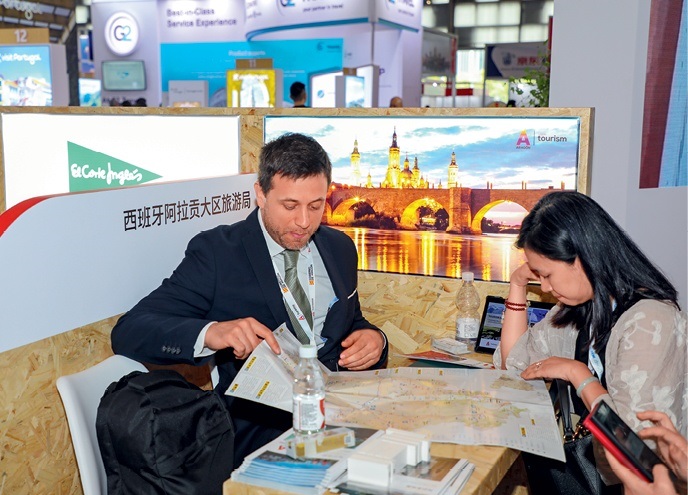
The 2025 China-Spain Mayors’ Dialogue is held in southwest China’s Chongqing on April 25, 2025.
Despite the vast geographical distance and cultural difference between them, cities in China and Spain are discovering that the challenges and opportunities of urban governance create a powerful common ground. Their shared vision was on full display on April 25, 2025, when Chongqing hosted a landmark trans-Eurasian dialogue – the 2025 China-Spain Mayors’ Dialogue.
Co-organized by the Chinese People’s Association for Friendship with Foreign Countries (CPAFFC) and Spain’s Cátedra China Foundation, this first-of-its-kind large-scale mayoral dialogue carried special significance. It commemorated the 20th anniversary of the comprehensive strategic partnership between the two nations and was built upon the momentum of Spanish Prime Minister Pedro Sánchez’s visit to China earlier in the month.
As Marta Montoro, director general of the Cátedra China Foundation, aptly stated, “Mutual understanding is the starting point for respect and cooperation.” The dialogue served as both a platform for exchanging
transformative governance wisdom and a bridge for future urban collaboration, offering innovative ideas for building resilient, sustainable cities.

From left to right: Julián Nieva, mayor of Manzanares. Xabier Alcuaz, mayor of Tafalla. Roberto Marcos, mayor of Langreo. Rosa Melchor, mayor of Alcázar de San Juan. Alaitz Zabala, senator of Basque.
Charting a Common Green Future
During one of the roundtable dialogues themed “building a new green ecology for towns and cities,” mayors from cities in both countries shared diverse, innovative approaches to green development, reflecting their unique regional and cultural contexts.
Spanish representatives emphasized the power of regulatory frameworks and public participation. Alaitz Zabala, parliamentarian from Spain’s Basque Autonomous Community, argued that building a green ecology is not merely an environmental project but entails a fundamental restructuring of local management, production, and consumption. “Discussing green ecology must first involve social justice and inclusion,” she noted, positioning energy transition not only as an ecological imperative but also a valuable opportunity for job creation and community revitalization.
The Basque Autonomous Community, a pioneer in Europe’s green transition, offers a compelling model. Zabala highlighted their 2024 Energy Transition and Climate Change Law, which sets a legally binding path to climate neutrality, including an ambitious target of reducing emissions by 45 percent from 2005 levels by 2030. Crucially, this effort has been further buttressed by the Basque Citizens’ Assembly, integrating diverse public voices into the policymaking process.
This focus on practical local action was echoed by other Spanish mayors. Francisco Rodríguez, mayor of Dos Hermanas in the Andalusia Autonomous Community, listed collaborations with local universities on projects spanning energy, transportation, and waste management. Antonio Melero, mayor of La Puebla de Cazalla, highlighted the tangible links to Chinese technology, noting, “The solar panels installed in our area use Chinese technology.”
Chinese representatives showcased a commitment to systematic governance and large-scale green transition. Zhang Bin, deputy head of Chongqing’s Wanzhou District, detailed local achievements in ecological protection and restoration, including over 20,000 hectares of integrated ecosystem. The result is exemplary air and water quality, alongside pioneering projects like the “Zero-Waste City” initiative and the Three Gorges Science and Technology Museum, a near-zero energy-consumption building.
He Zhengjun, executive vice mayor of Jiuquan City, Gansu Province, presented a vision powered by renewable energy. Home to China’s second-largest installed new energy capacity among prefecture-level cities, Jiuquan is a hub for equipment manufacturing. He pointed to the Belt and Road Initiative as a catalyst for deeper cooperation, “Jiuquan can rely on international logistics channels like the China-Europe Railway Express to achieve efficient connectivity with Spain,” he said, inviting collaboration in photovoltaics, smart grids, and energy storage.
As Roberto Marcos, mayor of Langreo, Asturias, summarized, “Our social environments are completely different ... but differences are not a weakness; this is an opportunity to share experiences and learn from each other.”

Brownstone is a well-known Spanish restaurant located in the Qiantan area of Shanghai’s Pudong, famed for its authentic cuisine and vibrant atmosphere.
The Soul of Governance: Listening, Sharing, and Collaborating
Beyond environmental policy, the Dialogue revealed a profound alignment in the philosophy of grassroots governance: citizen involvement, service delivery, and digital empowerment.
Spanish mayors shared their distinctive models. Sergio Navas, mayor of Herencia in Castilla-La Mancha, emphasized that the contemporary governance model is not hierarchical but networked, “requiring alliances with social organizations, universities, and the private sector.” Izaro Elorza, mayor of Oñati (a town of 11,500 with over 130 registered social organizations) in Basque, called for “an essential leap in the paradigm of collaboration,” bringing all societal forces together under a common roadmap.
Chinese counterparts demonstrated their own innovative strategies. Chongqing’s Shapingba District has implemented a “15-minute high-quality life circle” plan, ensuring residents have convenient and efficient access to essential services close to home. The district also leverages digital technology for governance, with 283,000 sensory devices and a self-developed “Digital Flood Control” system, now part of the UN Early Warnings for All initiative.
The mutual appreciation was clear. “In China, we have seen outstanding examples of digital transformation; in Navarra, we aspire to continue moving in this direction,” said Amaiur Guindeo, councilor of Burlada, Navarra Autonomous Community.
In an interview with China Today, Roberto Marcos, mayor of Langreo in Asturias, emphasized the value of city-to-city friendships, and expressed admiration for China’s governance of its megacities, highlighting the innovative “15-minute life circles” as a particularly inspiring model.

At the 2025 ITB Shanghai international travel fair on May 27, 2025, Spain presents its domestic tourism offerings.
 From Industrial Synergy to People-to-People Bonds
From Industrial Synergy to People-to-People Bonds The mayors also discovered strong synergies in sister-city cooperation, moving beyond ceremony to tangible, win-win partnerships.
Xing Zhengjun, mayor of Lianyungang (sister city with Sabadell and Melilla), highlighted the complementarity of their economies, noting the popularity of Spanish olive oil and ham in China and its advanced greenhouse technology. This was a sentiment warmly reciprocated by Julio Millán, mayor of Jaén, Andalusia, who introduced his city as “the city of olive oil,” and expressed a desire for greater agricultural cooperation with China.
The economic cooperation potential was underscored by data. Li Hui, vice mayor of Dongguan, Guangdong Province, revealed that the city’s trade with Spain reached RMB 14 billion last year, with nearly 20 Spanish-invested enterprises in the city, indicating “broad space for cooperation.”
Meanwhile, Deng Guanghuai, executive deputy head of Chongqing’s Yuzhong District, showcased initiatives like China’s first demonstration zone for convenient payment methods and the first international friendship city food street in central and western China, which features top Spanish restaurants.
As Lü Hongwei, deputy director of the European and Asian Affairs of the CPAFFC, concluded, “Cities are stages for mutual learning among civilizations, bearing the common expectations of the Chinese and Spanish people for a better future. Sister-city cooperation has not only enriched the connotation of bilateral relations but also created new opportunities for local development.” Proposals for the future were specific and action-oriented – from using culture and tourism as a bond, as suggested by Wu Xuejun, vice commissioner of Qiannan Buyei and Miao Autonomous Prefecture, to strengthening exchanges between entrepreneurs, especially small and medium-sized ones, and young innovators from the two countries, proposed by Dongguan’s Vice Mayor Li Hui.
This spirit was perfectly captured by Rosa Melchor, mayor of Alcázar de San Juan, “Like you, we are fighters, workers, and entrepreneurs; in our DNA is the dreamer’s spirit of Don Quixote and a pragmatic awareness.”
A New Multipolar World of Opportunity
For many Spanish attendees, the dialogue was a revelation that challenged preconceptions and highlighted the urgency of direct engagement.
Western media often fails to report on China objectively, noted Roberto Marcos, mayor of Langreo. He advocated for more Spanish young people to see China for themselves. “China opens up another possibility for us. The EU must explore a world that is no longer unipolar but multipolar, where China plays a very important role,” he told China Today.
First-time visitors expressed awe at China’s development. Xabier Alcuaz, mayor of Tafalla, felt China’s prosperity far exceeded his imagination, affirming that its effective policies have brought tangible benefits to the people. Alaitz Zabala from Basque praised China’s governance efficiency as something “many Western countries can learn from.”
Julián Nieva, mayor of Manzanares, expressed profound admiration: “In recent decades, China has become a reference for the world ... China will play a decisive role in world peace and global economic balance.”
This dialogue was more than an exchange of ideas on urban governance; it was a catalyst for a new chapter in Sino-Spanish relations. As cooperation deepens, more Spanish goods will find their way into Chinese homes, and more Chinese innovations will reach Spanish markets, turning the shared wisdom of mayors into a tangible reality for their citizens.